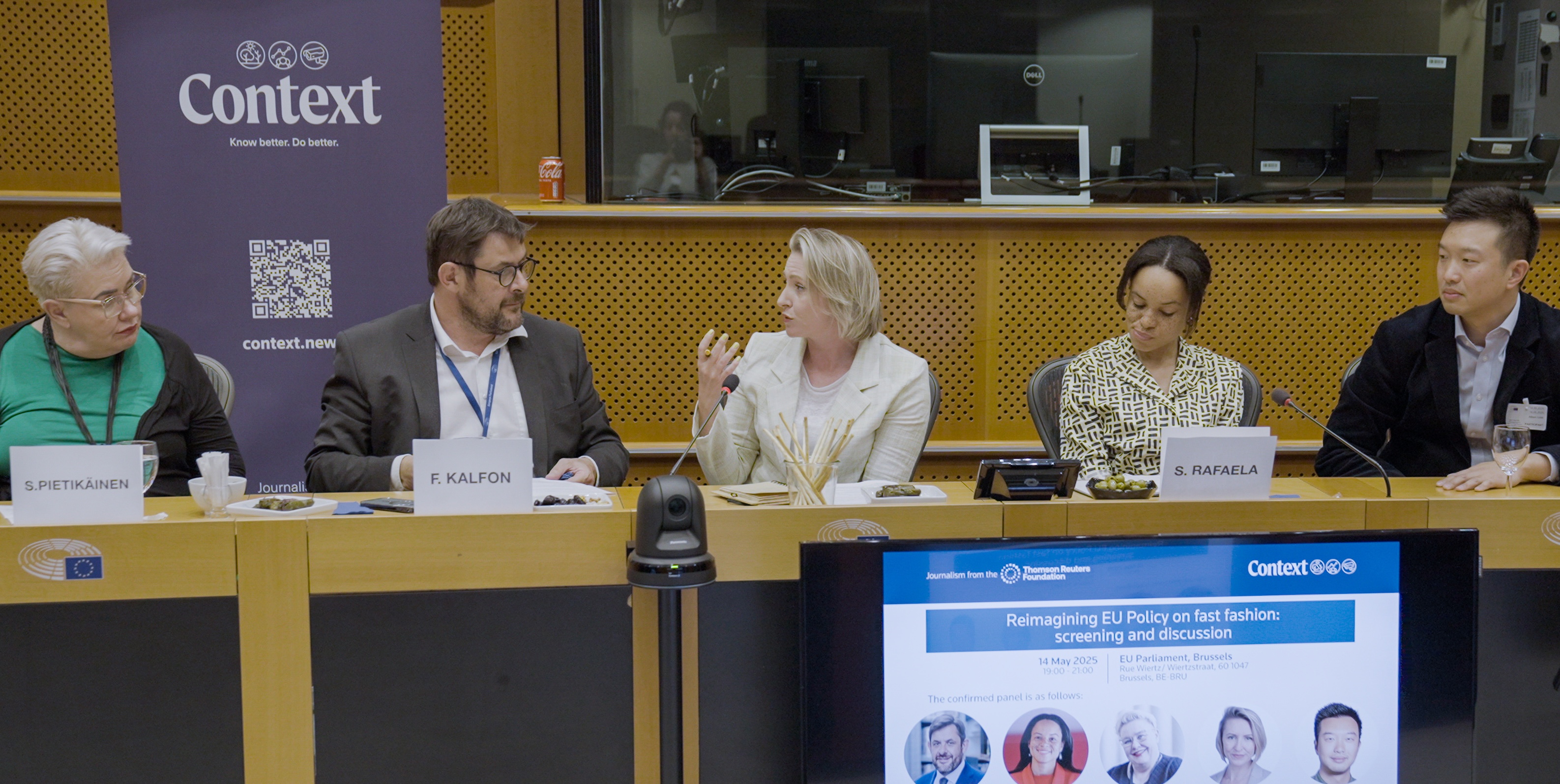 | Know better. Do better. |  | Climate. Change.News from the ground, in a warming world |
|
| | | By Jack Graham | Climate Journalist | | |
|  |
| Europe's capitalImagine an airport terminal in the middle of a city, its corridors full of people - from suited politicos to Sámi Indigenous people rushing between meetings.
I'm describing the European Parliament in Brussels, where Context colleagues and I showed our groundbreaking documentary on fast fashion last week.
Members of the European Parliament, or MEPs, NGO workers and businesspeople sat around a grand room fit for the continent’s leaders to watch our film and discuss its implications.
In case you missed it, the film by my colleague Albert Han revealed how fashion giants are turning increasingly to shipping by air, which has major impacts both on the environment and on working conditions for many of the millions of garment workers in Bangladesh.
In bringing this work to a cross-party group of European parliamentarians, we also got to hear directly how policymakers were struggling to respond to the issues our work raised. %20(1).jpg/640w) MEPs Sirpa Pietikäinen, François Kalfon and former MEP Samira Rafaela discuss fast fashion at the EU Parliament in Brussels, May 14, 2025. Argyro Christina Partsakoulaki/Thomson Reuters Foundation |
"Well,
I'm very frank with you," said Sirpa Pietikäinen, a long-serving MEP and a previous Finnish environment minister from the centre-right European People's Party (EPP) bloc.
"We all know what the political situation globally is with Trump and Trumpism. We know what it is in Europe, as the European Parliament, and in our member states," she told the panel, chaired by Context's Europe Correspondent Jo Gill.
An almighty battle is brewing in the European Union, the MEPs said, over hard-fought regulations aimed at holding companies accountable for their supply chains, including the fashion industry, which is causing major environmental and social damages.
With a new Parliament in place, much of that work could be undone as the power has shifted in favour of MEPs who want to make Europe more competitive globally and cut back on environmental regulations.
In particular, an omnibus package of measures proposed by the European Commission is being debated. It aims to reduce companies' obligations to report on sustainability.
Pietikäinen said those pushing for deregulation have a "grip" on the main parties of the centre and right in parliament, and that changing the rules will hit sustainable brands whose products cost more.
"This is not a level playing field for those who pay properly for workers, who know what they use, who use sustainable materials and so forth," she explained.  Garment employees work at a textile mill in Bangladesh, February 7, 2021. REUTERS/Mohammad Ponir Hossain |
LoopholesAt the event, I sat next to a woman from California who was practising her very own slow fashion: She was knitting while watching our
documentary.
Unfortunately, the textile industry itself isn't quite so innocent.
François Kalfon, a new French MEP from the centre-left Progressive Alliance of Socialists and Democrats (S&D), said China is taking over European logistics infrastructure and exploiting loopholes like the 150-euro customs allowance that cheap clothes imports can easily duck under.
A similar loophole in the United States was shut by President Donald Trump’s trade war, as small, direct-to-consumer packages from companies like China’s online clothing retailer Shein now face 54% tariffs.
But import rules are just one reason for the power of fast fashion juggernauts, which also enjoy significant tax incentives and customs support in places like China and Bangladesh, Kalfon said.
"This system is not just aggressive. It is heavily subsidised and organised by nation states, even empires," he said.
So how can the world, and Europe, slow down this express train - or plane - of cheap clothing?
|  | This system is not just aggressive. It is heavily subsidised and organised by nation states, even empires. | | |
| |
|
Samira Rafaela, a former Dutch MEP from the centrist Renew group and labour rights expert at Cornell University, said there is no excuse for companies that do not trace impacts in their supply chain - such as forced labour - with the innovations and technology available.
Rather than the burden of reporting for companies - a major argument against regulations - she said the impact on the planet and workers should hold more weight.
In the documentary, Context heard several such stories of burden, with women working overtime for no extra pay, dependent on an industry which continues to grow at breakneck speed.
We've explored this topic through our in-depth reporting in the region, and our Bangladesh correspondent Tahmid Zami will continue to investigate these stories on the ground.
Like Rafaela told us: "It's just really not fair that we are walking in these clothes every day, knowing what the stories are behind it."
See you next time,
Jack |
|
|
|